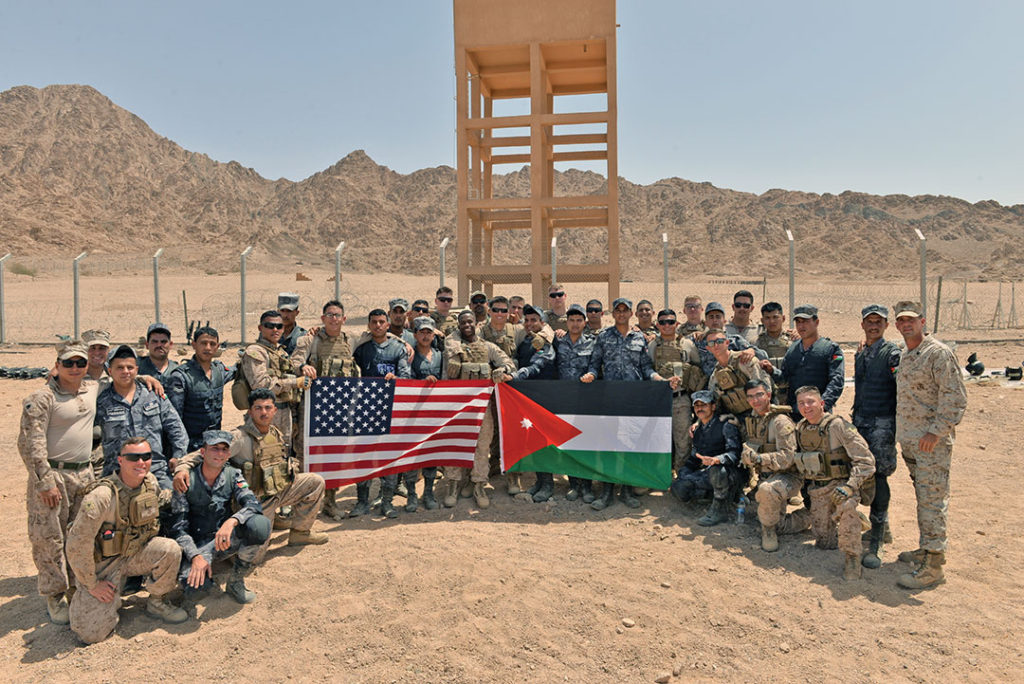Jordanian and U.S. troops complete the 8th annual Eager Lion military exercise
UNIPATH STAFF
Downpours the night before had left the normally dry desert floor laced with muddy trenches. Asked to repel enemy forces trying to slip across the border, Jordanian and U.S. Soldiers converted the trenches into defensive positions.
Troops from the Jordanian border guards and the California U.S. Army National Guard, their ankles and knees immersed in the remains of the rains, engaged in a muddy bout of mortaring and machine gunning.
They were using real ammunition and — combined with firepower from U.S. and Jordanian tanks, artillery and armored cars — provided an explosive climax to Eager Lion 2018.
The military exercise stretched across Jordan, engaging more than 7,300 troops from the two countries. The April 15-27, 2018, exercise — the eighth in a series — was bilateral, but Jordanian leadership has invited more than 40 countries for Eager Lion 2019.
“Right now we fully understand how our friends the Americans work, and they understand how we work,” said Jordanian Exercise Director Brig. Gen. Mohammed Al-Thalji. “That helps us in many aspects to integrate with each other and unify our efforts to achieve our goals and objectives.”
The missions at Eager Lion were designed so that ground, naval and air forces could respond to conventional and unconventional threats using realistic scenarios within a coalition environment.
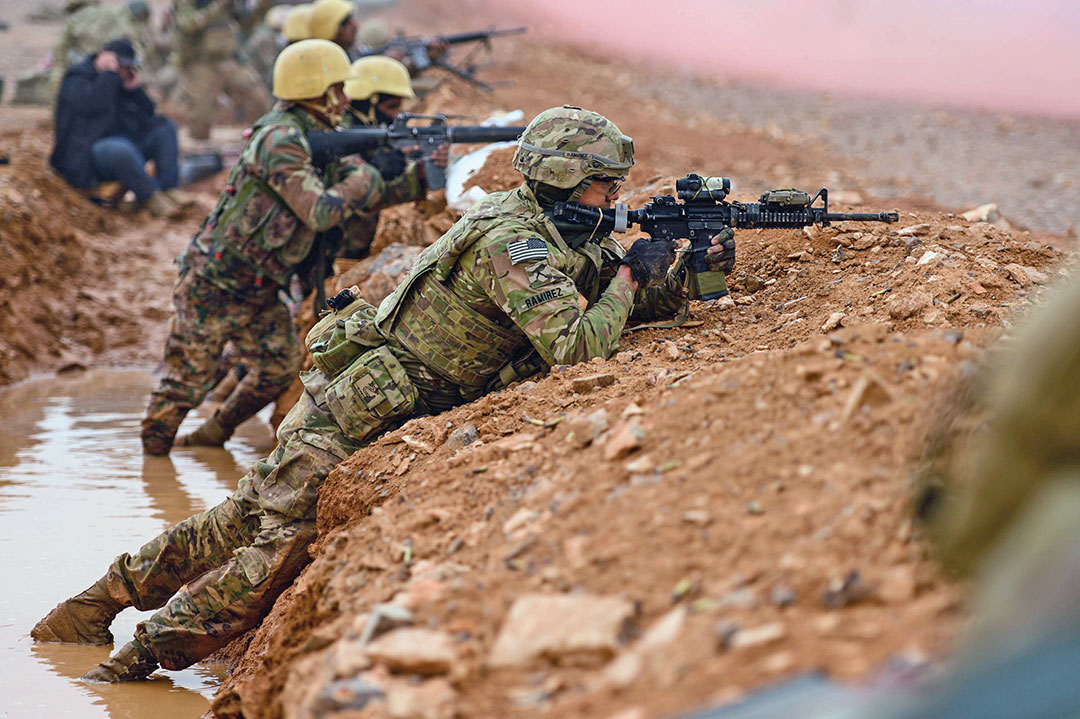
MASTER SGT. JOSHUA L. DEMOTTS/U.S. AIR FORCE
Soldiers stormed terrorist-occupied villages, evacuated an embassy and rescued passengers from ships in the Gulf of Aqaba.
They responded to a chemical attack, scattered propaganda leaflets over an occupied village and suppressed riots in a displaced persons camp.
“We are trying to come up with scenarios that simulate reality,” Brig. Gen. Thalji said. “Jordan is an oasis of security and stability in a region where the fires are surrounding and encircling Jordan from almost all sides.”
The U.S. Marine Corps had a large presence at Eager Lion 2018. When Marines weren’t taking target practice with the 77th Royal Jordanian Marine Battalion in the wilds of southern Jordan, they were flying helicopters over the Aqaba waterfront or donning hazardous material suits for chemical attack training.
At the King Abdullah II Special Operations Training Center near Amman, Marines evacuated staffers from a fictional embassy enveloped by angry, chanting protestors. Wearing street clothes and holding signs, Jordan Armed Forces Soldiers portrayed the rioters.
Whisked out the embassy door and loaded aboard buses for a flight to an airfield, the diplomats climbed into the backs of MV-22 Ospray aircraft and were flown to safety.
“Exercises like Eager Lion are ideal ways to prepare our forces to operate together in uncertain and dangerous conditions,” said U.S. Air Force Maj. Gen. Jon Mott, U.S. Central Command’s director of exercises and training and co-director of the exercise.
Although the exercise was bilaterial, a senior leader seminar tied to Eager Lion attracted generals from Bahrain, Egypt, Iraq, Kuwait, Lebanon, Oman, Pakistan, Qatar, Saudi Arabia, the United Arab Emirates and other countries.
Leaders shared ideas and experiences about foreign fighters, controlling ungoverned spaces and the latest developments in unmanned aerial vehicle technology.
When shown maps suggesting ungoverned regions in the Middle East and South Asia, national representatives were quick to emphasize that instability occurred only in small pockets of their countries.
But Jordanian Brig. Gen. Azzam Rwahneh, who made a presentation at the seminar, said military operations were just one component of ensuring national stability. Also important were good governance, societal justice, anti-corruption efforts and the rule of law.
“No single state can counter this kind of threat itself,” he said.
Gen. Mott declared that the region offered no quick and easy victories and called upon coalition forces to learn and evolve to defeat regional threats.
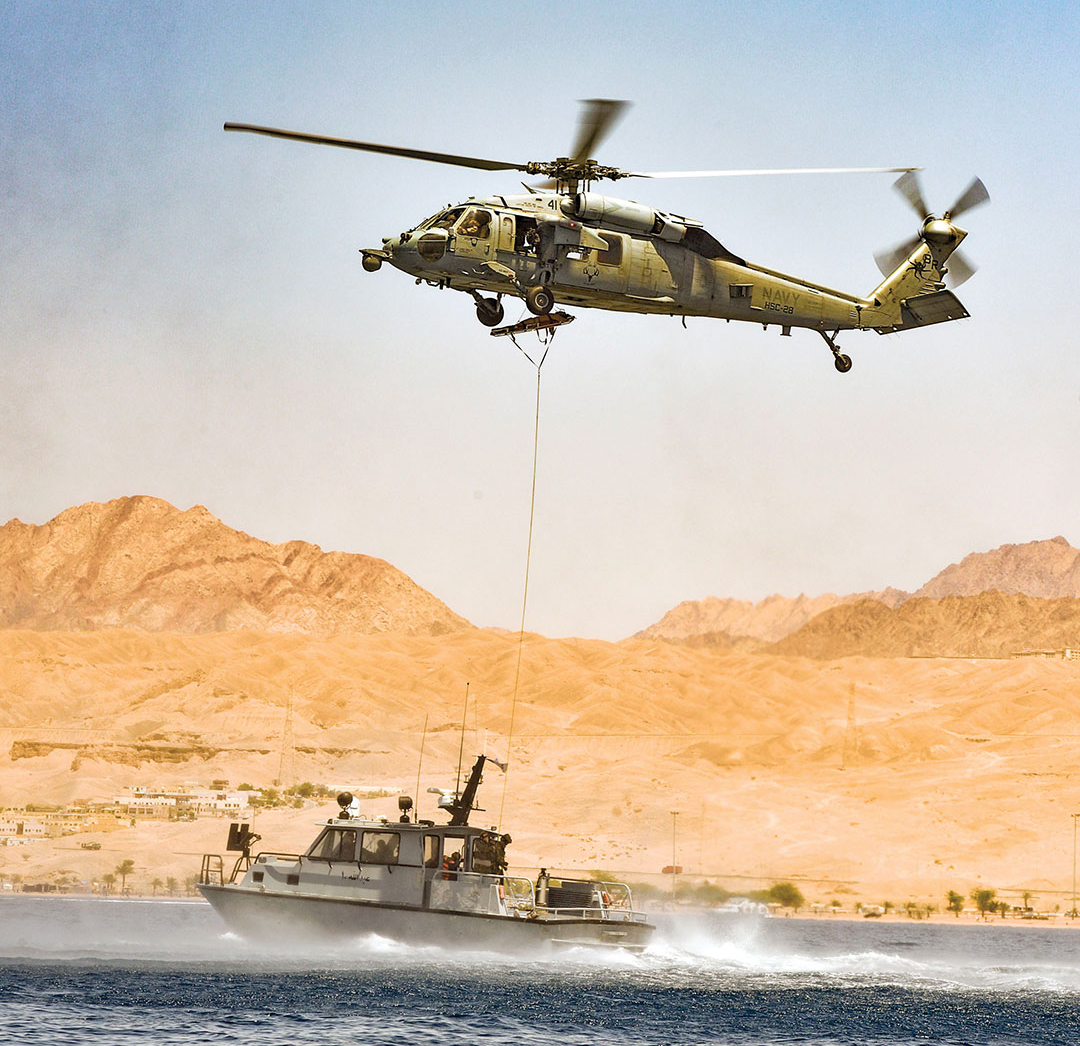
Petty Officer 1st Class Sandi Grimnes Moreno/U.S. Navy
“We must prevail when called upon to protect our people. The surest way of accomplishing this is working together as partners,” Gen. Mott told seminar attendees.
Jordan’s isolated — but not ungoverned — deserts were the setting for several training events.
In one “mass casualty” simulation near Queirah, an improvised explosive device injured six Soldiers. Jordanian ambulances sped the “wounded” to U.S. military medical tents, including a mobile operating room.
“It’s been an excellent experience, both serving the Marines and also working with the Jordanians,” said Cmdr. Alan Flanigan of the Shock Trauma Platoon, a U.S. Navy unit that assisted in the exercise.
Farther north near Amman, two Jordanian infantry companies with the Princess Basma Army rushed from building to building to clear a simulated village stuck in the desert. American trainers were on hand to assist.
“It’s a unique opportunity for our Soldiers to come over to their country and be exposed to how they do things as well as their way of life,” U.S. Army 1st Lt. Luke Prolx said after watching his Jordanian partners perform the drills.
Amid the crack of rifles and the roar of engines, Eager Lion, as it has evolved since the early days of 2011, is placing greater emphasis on defending against nonmilitary threats like cyber attacks, ideological warfare and terrorist propaganda.
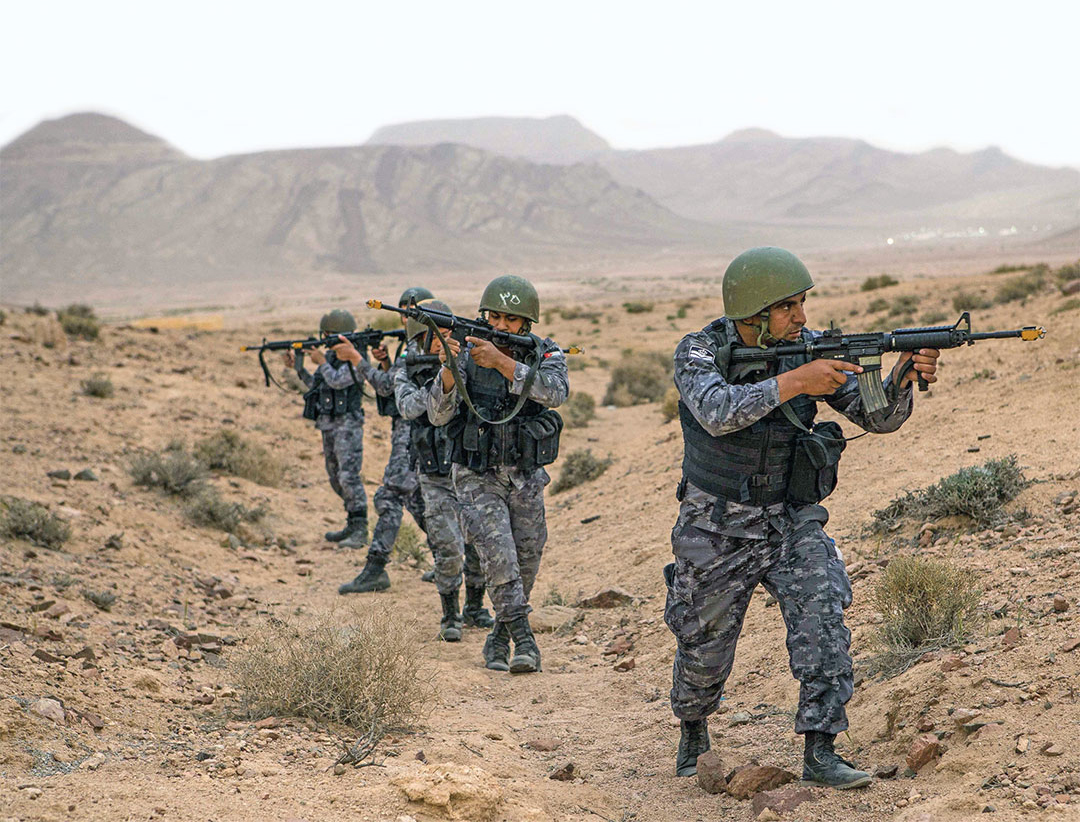
Jordan Armed Forces imams and U.S. military chaplains held several events together, including a reception at the Prince Hassan College for Islamic Studies in Zarqa.
Here Jordan’s religious leaders train military clergy to advocate an Islam untainted by violent extremism and aligned with His Majesty King Abdullah II bin Al Hussein’s Amman Message.
“Our efforts evolved into anti-extremist training courses about a year ago. These courses contain materials that study the problem and provide aspects of persuasion and evidence,” said Brig. Gen. Dr. Ibraheem Abu Aqab, dean of Prince Hassan College.
“We are not limited to describing the phenomenon of extremism, but we identify the disease and medicine by correcting religious concepts that extremists use because of their misunderstandings.”
Jordanian and U.S. commanders praised Eager Lion 2018 as a testament to seven decades of friendship between the countries. The 2019 version of Eager Lion, scheduled for late August and early September, should be more complex with the inclusion of potentially dozens of other countries.
“We are very pleased with the exercise results. We in the Jordan Armed Forces benefit from the teamwork in the planning and execution,” said Brig. Gen. Azzam, the officer in charge of the command center that issued orders to thousands of Eager Lion participants. “I would like to express my gratitude to our partners in the U.S forces.”
A Humane Mission
Jordanian and U.S. troops dispense gifts and goodwill at an Amman orphanage
UNIPATH STAFF | Photos by SGT. 1ST CLASS WHITNEY HUGHES/U.S. ARMY
A combined force of 30 uniformed U.S. and Jordan Armed Forces Soldiers were recruited for a unique mission at Eager Lion 2018. The projectiles they used were nothing more lethal than soccer balls, and target practice entailed the use of goalies and nets.
This humanitarian visit to a Jordanian orphanage, arranged by Jordan’s military imams and their counterparts among U.S. military chaplains, was a first for Eager Lion in its eight-year history.
Although the visit offered parallels to fictional scenarios in the military exercise dealing with displaced people, the main motivation was to bring joy to young orphans traditionally treated as outcasts in society.
SOS Children’s Village Amman provides a measure of home life for 40 abandoned and parentless children ages 2 to 17. Young adults make up another 14 of the residents.
When the village was established in 1983, the Jordanian government provided the land in a wooded, hilly district of Amman away from the urban bustle of the nation’s capital. The buildings and grounds provide a pleasing environment of shade trees and well-groomed flower beds.
Here the children study, tend the gardens, play sports and operate computers under the watchful eyes of “house mothers” who live on-site and serve as substitute parents.
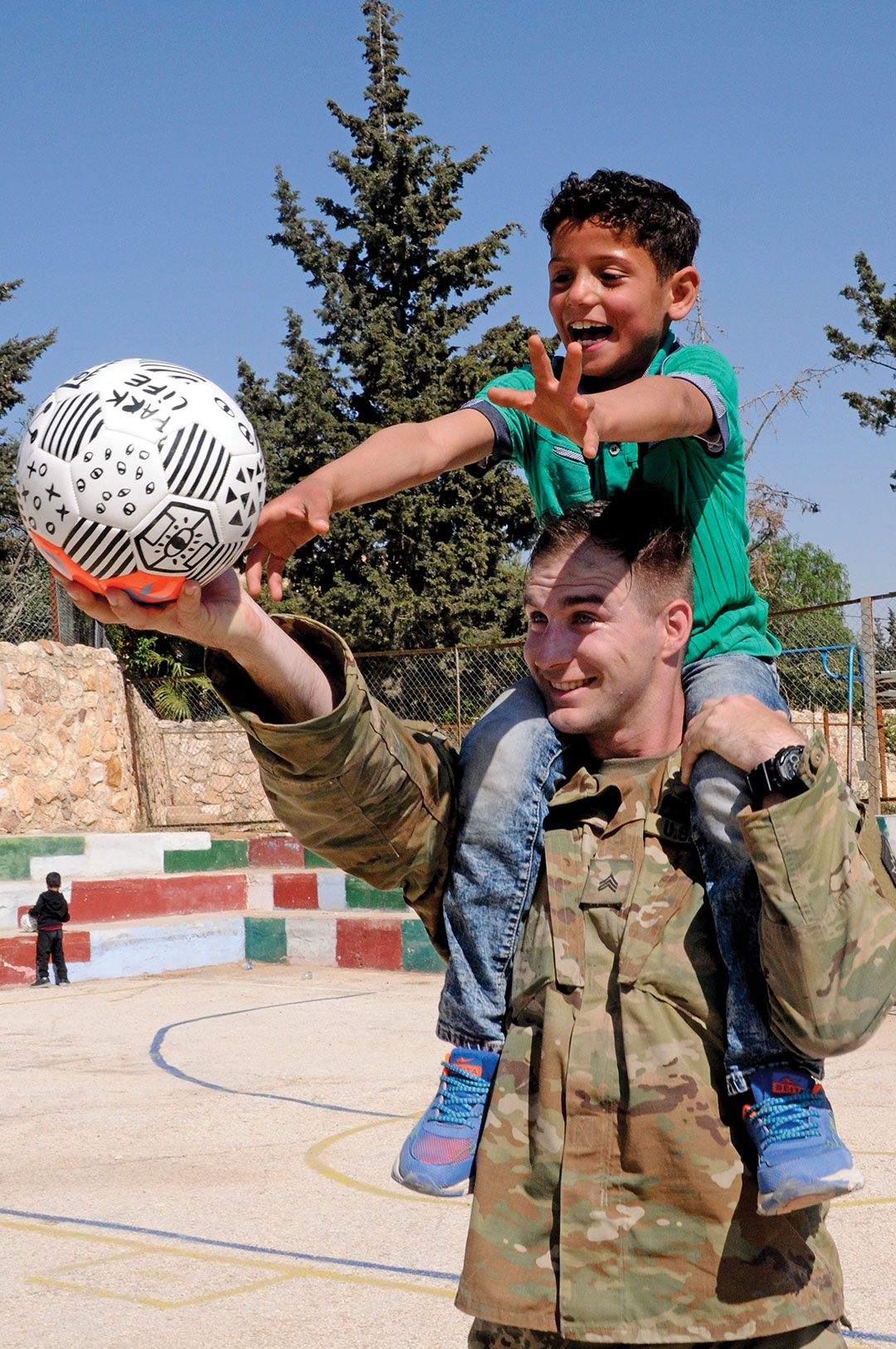
Since the children are severed from family and tribal affiliation — key identifiers in Jordanian society — the village gives them new names and identities. Reintegrating into society isn’t easy for the orphans when they reach adulthood, but the village aims to make that transition easier.
Under a cool, cloudless sky, American and Jordanian Soldiers joined 25 children on a playground, dribbling and kicking soccer balls. Five kids tried to score on an American goalie who laughed as multiple balls pummeled his body.
“I’m getting tired, man!” he said after 10 minutes of this treatment.
A female American Soldier flipped a little girl upside down and tickled her stomach. Other troops offered high-fives and fist bumps to the children.
The two-hour visit ended with a presentation of gifts — the children received soccer balls from the Americans and wristwatches from the Jordanians.
Maj. Pinkie Fischer, a U.S. Army chaplain, said the visit was a success on several levels: U.S. and Jordanian religious affairs teams strengthened friendships, reinforced the objectives of their military commanders at Eager Lion and established a precedent for helping the needy at future exercises.
“Hopefully it initiated a new annual mission that will be a part of the Eager Lion exercise,” Maj. Fischer said.
SOS Children’s Villages also operate in Aqaba in southern Jordan and Irbid in northern Jordan.
Dr. Khamis Sirhan, a Jordanian military imam who watched the lively interaction among Soldiers and children, summarized the military mission to the orphanage: “It’s a delegation of peace.”
Information Operations
Jordanian troops communicate with noncombatants through leaflets, cellphones and loudspeakers
LT. MOHAMMAD ALKHAWLDA, JORDAN ARMED FORCES
As part of the Eager Lion 2018 exercise, the Directorate of Morale Guidance for the Jordanian Armed Forces-Arab Army conducted a scenario dealing with terrorist cells near residential areas, with the directorate working to gain the residents’ trust by communicating with them through all modern means and technologies.
The directorate worked side by side with its American counterparts to conduct a joint exercise of dropping leaflets on an area under enemy control to inform them of the imminent execution of an airstrike on enemy positions.
The C-130 came in low over the desert, its engines droning loudly, and dropped a shimmering cloud of leaflets to blanket the area.
The text of the leaflets read: “Dear citizens, Coalition forces will bombard the terrorist groups so that you can enjoy security and safety. Please move away from the terrorists’ locations and assemblies, and please contact us to identify the terrorists’ locations.”
While the leaflets were dropped, loudspeakers from the front lines began calling on citizens to move away from terrorist positions and to dial a phone number to reach coalition forces. At the same time, mobile phone owners in the area of operations received a text message.
It was a highly skilled and accurate operation. All details were executed successfully, demonstrating the efficiency and professionalism of the training course.
Eager Lion provides a genuine opportunity to learn, exchange military expertise and standardize concepts among all participants. Training is carried out in several stages, in which the participants’ efforts are combined, duties are distributed, and all branches cooperate to work under conditions and challenges similar to those of real operations, contributing to building the participants’ skills.
The nature of my work in Eager Lion as an operations and information officer allows me to operate side by side with friendly forces in planning and preparing information operations. We analyze the target audience, creating the products and using the appropriate means to achieve the desired effect.
On the margins of preparations for Eager Lion 2018, I also participated as a trainer in a workshop titled “The Impact of Military Information Operations on Target Audiences,” held by the directorate two weeks before the launch of Eager Lion. Officers and noncommissioned officers from various branches of the Jordan Armed Forces-Arab Army participated, in cooperation with American forces.
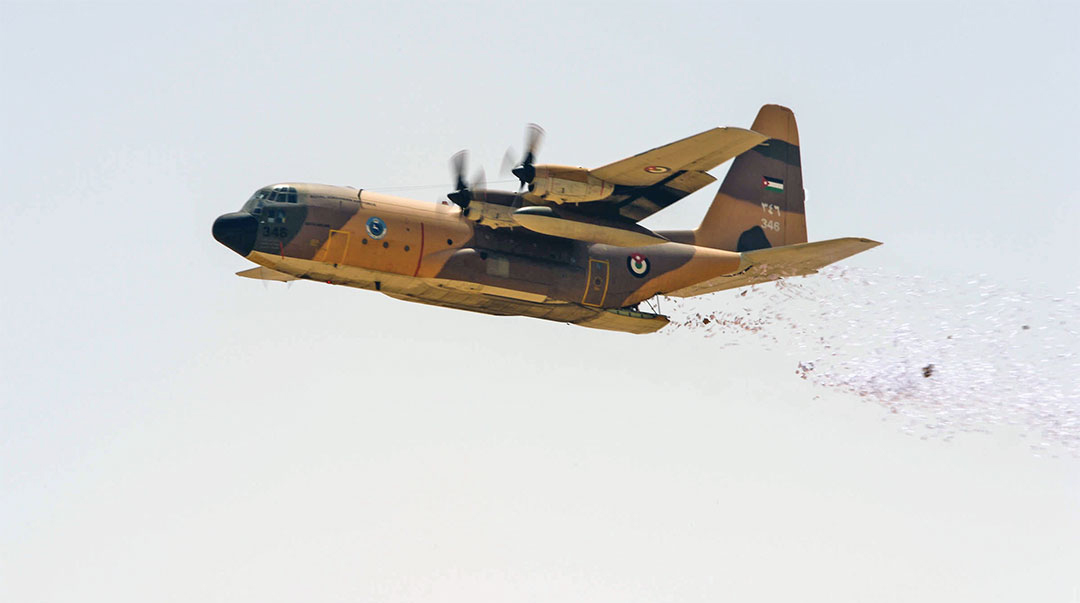
The workshop was aimed at enabling capable individuals to deal with information operations, adapt to the atmosphere of an operations scenario, and work with friendly forces in the same field. They were trained in the best use of equipment and special tasks for information operations, coordination and standardizing concepts among various agencies.
The course covered several topics, including analyzing the target audience, preparing information for the operations arena, military decision-making processes, selecting means of persuasion and the appropriate media, and methods of communication and the use of technology. Also included was training to drop leaflets, which was done as part of Eager Lion for the first time in cooperation with the Royal Jordanian Air Force.
We had two teams, ground and air. The air team’s task was to drop the leaflets from the plane and coordinate with air traffic control to determine the location of the drop. The team was trained on how to drop the leaflets to ensure wide distribution over the target area. The leaflets were dropped half an hour before the airstrikes began. The Air Force made precise calculations based on the plane’s altitude and the wind speed and direction to make sure leaflets fell in the target area.
In addition, 55,000 leaflets were prepared in dedicated boxes with holes in their sides to affect a proper release and distribution. The boxes were connected to a static line like that used by paratroopers to ensure that the leaflets fell in the designated area.
The air team consists of five people, including a photographer to document the drop. The ground team, consisting of six people, is assigned to set up loudspeakers in the target area and use text messaging to communicate with residents in the target area under enemy control.
Sgt. Omar Jamil al-Kharabsheh of the leaflet drop team said: “Military training in information operations with American forces during Eager Lion 2018 is an important domain for interacting with our partners to exchange expertise and experiences and build the capabilities of individuals and ranks in the Jordan Armed Forces. The friendly American forces are considered the strongest in the world in various military fields, especially in the field of information operations and psychological operations with respect to information’s importance for the military. Various exercises have been conducted in this area, which complements field operations. Considering current circumstances affecting the region, which is undergoing diverse, rapid changes, the exercise was realistic in addressing the variables in the region.”
All participants were trained in the writing, design and preparation of the leaflets, as well as the use of loudspeakers and the Pulse app to send messages to mobile phones in the target area. This training was a continuation of initial training the same team received last year.
Sgt. 1st Class Qais Al-Assaf, commenting on the experience he gained from learning to use Pulse to send short messages to mobile phones, said:
“As for the topic of the training, it clearly and honestly reflects the attacks by terrorist groups on most countries and the aggression and persecution that countries are subjected to by those terrorist groups. I believe that what we trained on during the exercise must be put into practice and utilized in military operations. The most important training that was implemented during the exercise, which I hope will be utilized and applied, is the method of communicating with residents by delivering important information to the population of an isolated region, where it’s very difficult to communicate with them, and deliver information to them clearly and safely by dropping paper leaflets from above the region containing the information to be delivered to the region’s residents. Information has been delivered this way to the largest possible number of residents in a short period of time.”
In short, Eager Lion is an important and strategic part of the relationship between the Jordanian and American armies. It is an opportunity for the two countries to train and stay ready by working together to ensure the ability to operate in various critical and dangerous circumstances.

